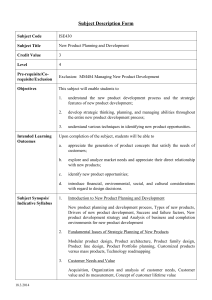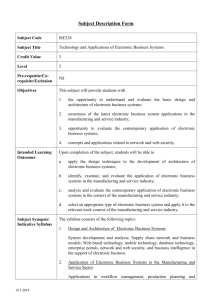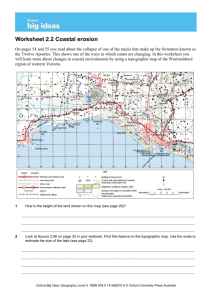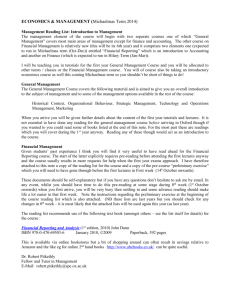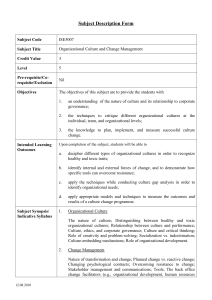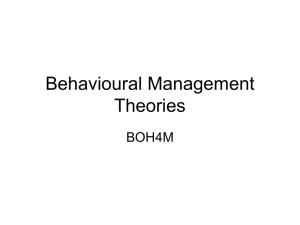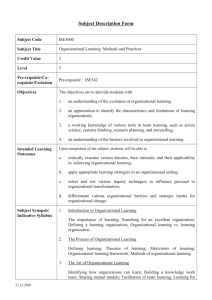- C5. DEFINITIVE COURSE DOCUMENT AND COURSE FILE
advertisement
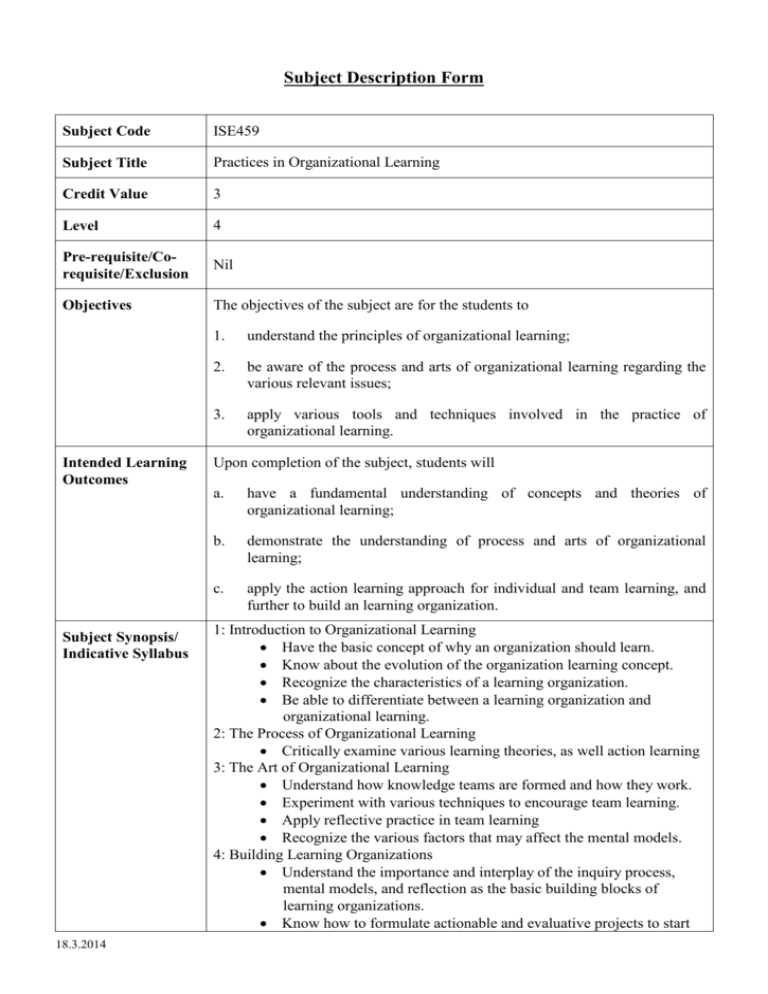
Subject Description Form Subject Code ISE459 Subject Title Practices in Organizational Learning Credit Value 3 Level 4 Pre-requisite/Corequisite/Exclusion Nil Objectives The objectives of the subject are for the students to Intended Learning Outcomes Subject Synopsis/ Indicative Syllabus 18.3.2014 1. understand the principles of organizational learning; 2. be aware of the process and arts of organizational learning regarding the various relevant issues; 3. apply various tools and techniques involved in the practice of organizational learning. Upon completion of the subject, students will a. have a fundamental understanding of concepts and theories of organizational learning; b. demonstrate the understanding of process and arts of organizational learning; c. apply the action learning approach for individual and team learning, and further to build an learning organization. 1: Introduction to Organizational Learning Have the basic concept of why an organization should learn. Know about the evolution of the organization learning concept. Recognize the characteristics of a learning organization. Be able to differentiate between a learning organization and organizational learning. 2: The Process of Organizational Learning Critically examine various learning theories, as well action learning 3: The Art of Organizational Learning Understand how knowledge teams are formed and how they work. Experiment with various techniques to encourage team learning. Apply reflective practice in team learning Recognize the various factors that may affect the mental models. 4: Building Learning Organizations Understand the importance and interplay of the inquiry process, mental models, and reflection as the basic building blocks of learning organizations. Know how to formulate actionable and evaluative projects to start the organizational learning process. Teaching/Learning Methodology A mixture of lectures and workshops are used to deliver the modules in this subject. Lectures are few, and most of the teaching is conducted in the form of interactive small-group activities. Students practice various techniques themselves, and report on their observations and findings. Assessment Methods in Alignment with Intended Learning Outcomes Specific assessment methods/tasks % weighting Intended subject learning outcomes to be assessed a b c 1. Individual assignment/ project 40% 2. Test 20% 3. Group project 20% 4. Reflective Journal 20% Total 100% The assessment methods involve both individual and team learning, and require students to apply the learned knowledge. The various forms of assessments/assignments facilitate students to not only understand the learned topics, but also to reflect on the topics. Student Study Effort Expected Assessment Methods 1 & 2: Assignments and test assess the students’ understanding on the basic concepts of the subject. Assessment Method 3: Project assesses the students’ ability in application of the learned knowledge, that is, the techniques in assessing corporate ventures and the management of innovative entrepreneurship. Assessment Method 4: Reflective journal requires students to demonstrate how they can incorporate the concept and theories of organizational learning in the learning process of the subject concerned. Class contact: Lectures 12 Hrs. Workshop/case study/tutorial 27 Hrs. Other student study effort: 18.3.2014 Reading 42 Hrs. Project/Assignments 30 Hrs. Total student study effort Reading List and References 18.3.2014 111 Hrs. 1. Argyris, C. 1999, On Organizational Learning, 2nd ed. Malden, Mass.: Blackwell Business. ISBN 0-631-21308-2 2. Argyris, C. 2000, Flawed Advice and the Management Trap: How Managers Can Know When They're Getting Good Advice and When They're Not, Oxford and New York: Oxford University Press. ISBN 0-19513286-6 3. Argyris, C. 2004, Reasons and Rationalizations: The Limits to Organizational Knowledge, Oxford: Oxford University Press. ISBN 0-19926807-X 4. Senge, PM 2006, The Fifth Discipline: The Art & Practice of The Learning Organization, New York: Doubleday/Currency 5. Torbert, B 2003, Action Inquiry, the Secret of Timely and Transforming Leadership, San Francisco: Berrett-Koehler Publishers, Inc.

